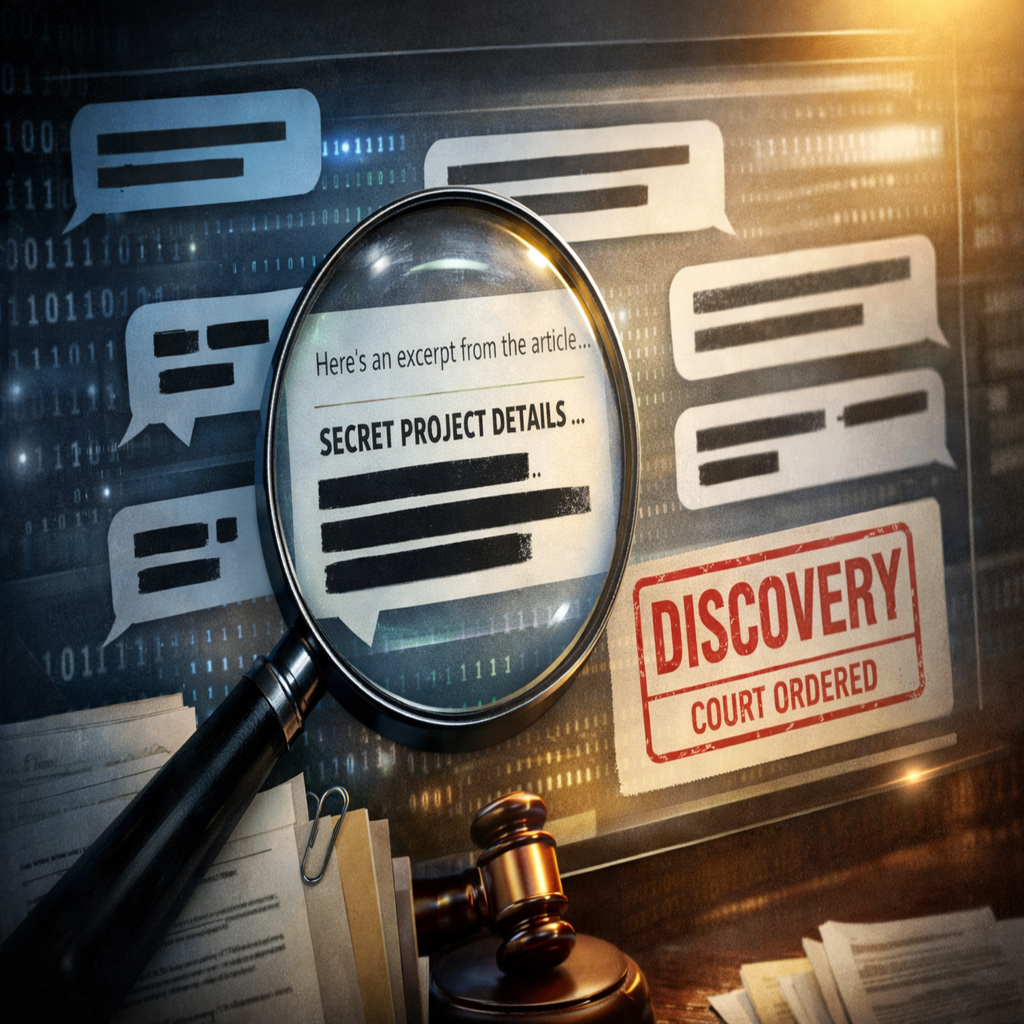Insights < BACK TO ALL INSIGHTS
Chatbots, Copyrights, and the Courts: The Latest in Litigation Developments in the Cases Against OpenAI
FEATURED
January 5, 2026
Chatbots, Copyrights, and the Courts: The Latest in Litigation Developments in the Cases Against OpenAI
By: Abbey Block
Litigation Update: Open AI’s Discovery Woes and Fair Use Defenses in Infringement Lawsuits Since its formation in 2015, the artificial intelligence company “Open AI” – most known for its creation of the widely used chatbot, “ChatGPT” – has faced its fair share of legal disputes. Two of the most notorious lawsuits, one filed by the New York Times and the other by a class of prominent fiction authors, are moving full steam ahead, illustrating the complex interplay of legal rights, litigation tools, and technological innovation. This blog post examines the most recent developments in the lawsuits, and considers what these developments mean for the parties, and the future of artificial intelligence more broadly. Judge Orders Open AI to Disclose Chat…
The Truth Will Out – Even About Mar-a-Lago
December 27, 2025
The Truth Will Out – Even About Mar-a-Lago
By: James Trusty
The Truth Will Out is a fairly obscure phrase that was popularized in Shakespeare’s “The Merchant of Venice.” It suggests that even against the most active obstruction and obfuscation, the Truth seemingly has an invisible hand behind it that relentlessly—if slowly—pushes it into plain view. Nearly 2 ½ years after the FBI’s raid on Mar-a-Lago, the Truth may be emerging into the daylight. August 8,…
White-Collar Sentencing Under the Amended Guidelines: Fewer Steps, Same Dance
November 12, 2025
White-Collar Sentencing Under the Amended Guidelines: Fewer Steps, Same Dance
By: Robert Ward
For years, the U.S. Sentencing Commission’s Guidelines Manual has guided courts through a three-step process to determine the sentence to be imposed. At a high level, that process looked like this: First, the court would calculate the guideline range based on relevant offense conduct and related factors, along with the defendant’s criminal history. Second, the court would consider the Sentencing Commission’s policy statements or commentary…
Perjury, Obstruction, and Barry Bonds’ Conviction
June 6, 2011
Perjury, Obstruction, and Barry Bonds’ Conviction
By: Ifrah Law
Last month, an article in the National Law Journal asked a question that has been on the minds of many: “Did Barry Bonds really obstruct justice?” In April a jury convicted baseball legend Barry Bonds on one count of obstruction of justice based on the testimony he provided before a federal grand jury investigating the use of illegal steroids in professional sports. The jury, however,…
Black Friday Chills Legislative Momentum in Nevada and Elsewhere
May 25, 2011
Black Friday Chills Legislative Momentum in Nevada and Elsewhere
By: Ifrah Law
Just a couple of months ago, there was considerable optimism after the introduction of an interactive-gaming bill in the Nevada legislature that that state could be the first to legalize online poker. However, in the wake of last month’s “Black Friday” indictments, it now appears that the optimism was premature. The state legislature is clearly waiting for the issue of online gaming to be resolved…
Federal Indictment in Maryland Reflects Continuing Crackdown on Gaming
May 24, 2011
Federal Indictment in Maryland Reflects Continuing Crackdown on Gaming
By: Ifrah Law
The U.S. Department of Justice is continuing its crackdown on the online gaming industry. On May 23, 2011, the U.S. attorney for the District of Maryland unsealed an indictment that charged several poker and gambling sites with illegal gambling and money laundering. Those indicted were ThrillX Systems, Ltd., d/b/a BetEd; Darren Wright; and David Parchomchuk, both of British Columbia, Canada, as well as K23 Group Financial…
Barney Frank’s Advice to Poker Players After ‘Black Friday’
May 9, 2011
Barney Frank’s Advice to Poker Players After ‘Black Friday’
By: Ifrah Law
In the wake of the catastrophic consequences of last month’s “Black Friday” for online poker players in the United States, many players are wondering about their next step. Pocketfives.com recently interviewed Congressman Barney Frank and although he agreed that is “difficult to figure out what to do,” he still had some concrete advice for the online poker player universe. Frank felt that the events of…
Bank Hit With FCA Complaint Over Mortgage Lending
May 3, 2011
Bank Hit With FCA Complaint Over Mortgage Lending
By: Ifrah Law
On May 3, 2011, the U.S. Department of Justice filed a civil case against Deutsche Bank, Germany’s largest bank, asserting that Deutsche Bank was liable for more than $1 billion to the U.S. government for its statements and actions during the mortgage meltdown of the last few years. This case is one of the few that has emerged from the mortgage crisis, and like many…





